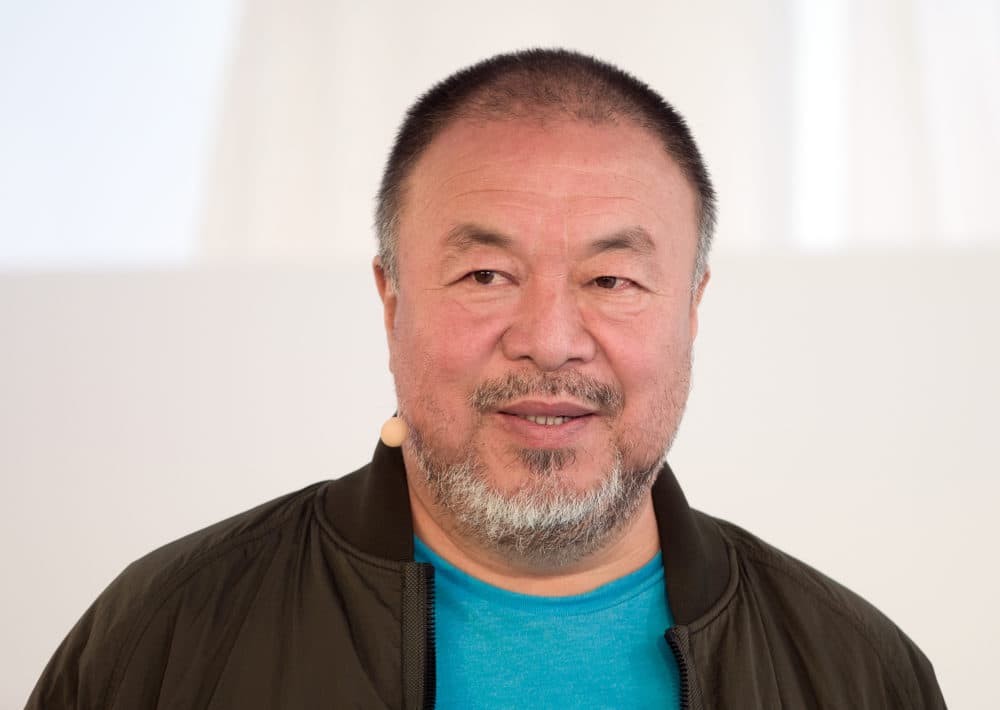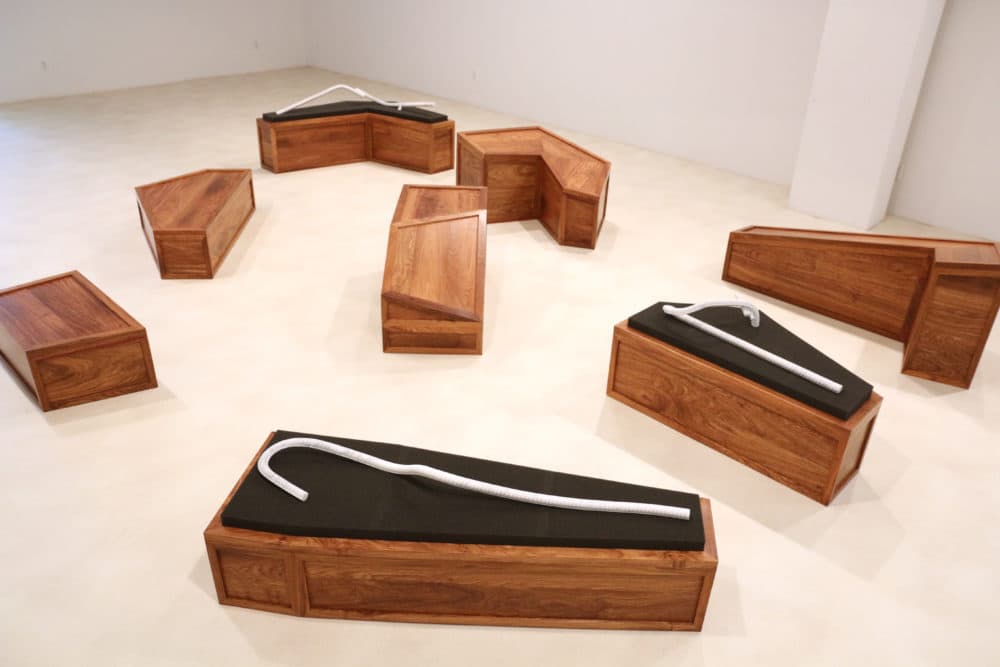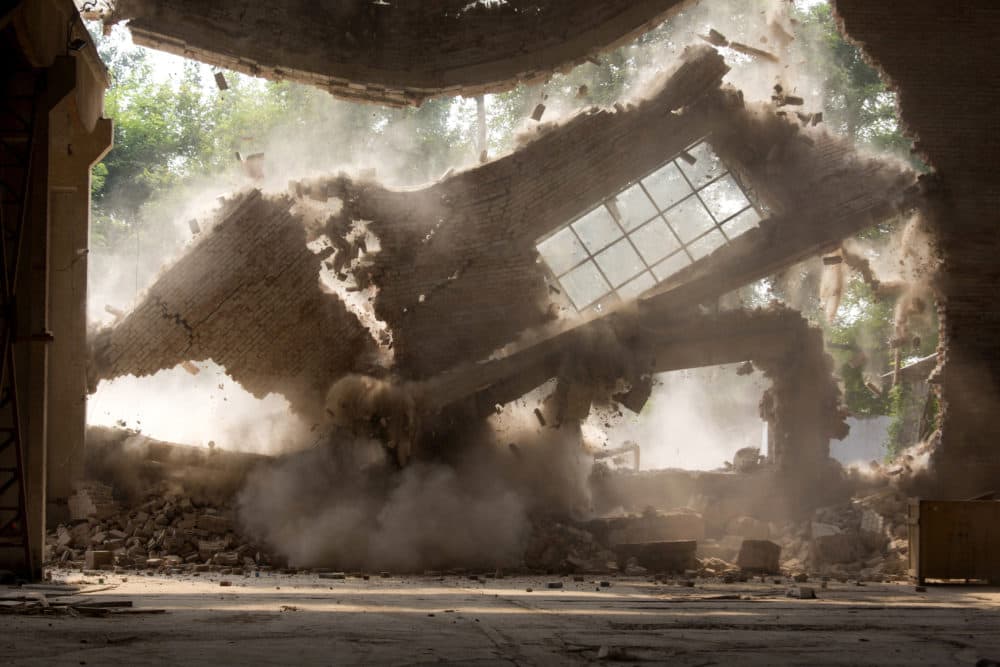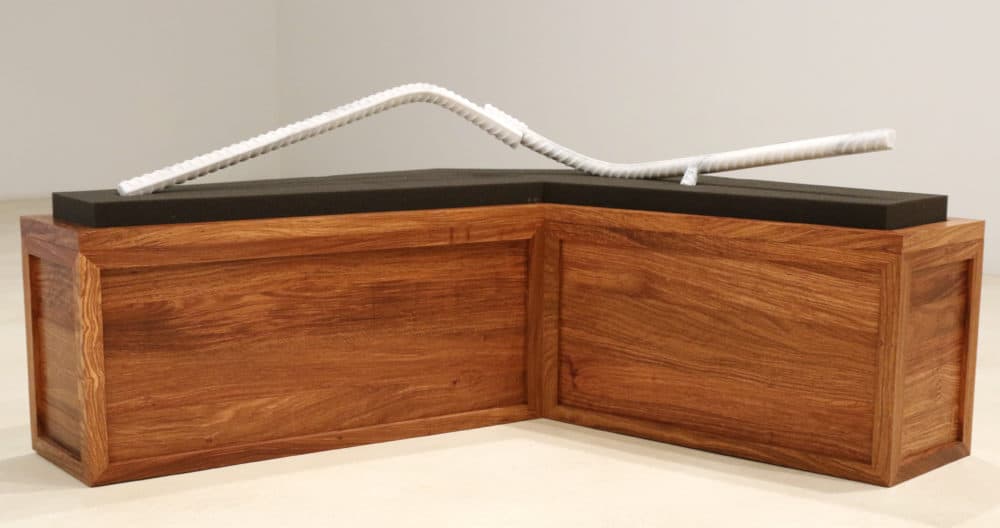Advertisement
Artist And Activist Ai Weiwei: 'What We Want To Preserve Is Our Memory'
Resume
Chinese artist and dissident Ai Weiwei has a new exhibition, "Rebar and Case," in Provincetown, Massachusetts. In it he combines marble and twisted rebar salvaged from the ruins of the 2008 Sichuan earthquake to represent and memorialize the more than 5,000 children who died there — kids whose deaths he says the Chinese government largely covered up.
The exhibit comes on the heels of the Chinese government's destruction of Ai's iconic studio, to create a shopping mall.
Here & Now's Robin Young talks with Ai (@aiww) about the new exhibit, and how memory and preservation inform his work and life.
Interview Highlights
On the struggle for truth in China and the symbolism of the materials used in his exhibit
"First, when you are living in a state, a lot of a struggle is to insist for the facts, for the truth — what happened. But that, you never would get. People think [it's] even ridiculous to ask for truth.
"It's effort, it's continuous effort to find out the truth and to speak out about what happened. I wanted to make something very physical people can feel, can understand it, and they would understand the material before they know the meaning. Rebar is a material which is industrial and for construction, but at the same time has a strong meaning, because thousands of students, their life disappeared under those badly constructed buildings. That's how we selected the rebar, in its original form from the ruins, and we copied it basically with marble.
"It is [a] memorial. We really carefully designed those boxes kind of like a surrealist sculpture, and the contents of the rebar is like a lively body."

On his emotional reaction to the Sichuan earthquake
"It hits me. But like all those tragic moments that happen in China, this is not the largest earthquake. One earthquake in 1976, 300,000 people disappeared, but nobody knows more than this number.
"During 2008, when we hear this earthquake, I become speechless, I stopped writing, I have to go to those ruins to really see, to find the language, because you don't have existing language in dealing with such a tragic sense. So rebar is some kind of vocabulary I picked up there, and I think that can be developed."
"This shows a typical condition in China. There's no space for any kind of discussion. They just come, and you take the consequence."
Ai Weiwei, on the destruction of his Beijing studio by the Chinese government
On the Chinese government demolishing his Beijing studio and trying to preserve memories in an authoritarian state
"This is not the first time. They demolished my Shanghai studio right after I built it. That was shocking. But this is also shocking. This shows a typical condition in China. There's no space for any kind of discussion. They just come, and you take the consequence.

"What we want preserved is our memory. This kind of powerful government always wants to erase the memory. We cannot relay our emotions to the past, so to preserve certain senses, it's about to see who we are and where we come from."
"For me it is [art]. It has emotion, has a form — has a minimal form — and carries meaning for many, many people. Those names ... it's their whole life."
Ai Weiwei
On his door-to-door search for the identities of the victims of the Sichuan earthquake, and his blog posts — revealing the victims' names and the government cover-up — being a form of art
"We discovered ... 5,335 students disappeared. And when we did the investigation in search of a student's name and the birthday, the school, under which school, which class — so all those is to give those numbers some meaning.
"For me it is [art]. It has emotion, has a form — has a minimal form — and carries meaning for many, many people. Those names ... it's their whole life."

On U.S.-Chinese relations and globalization
"Both nations benefited by globalization. China become rich, powerful society, and the U.S. enjoyed the cheap labor and the place they can dump their garbage and explore all those areas which human rights ... hardly can be mentioned.
"China, it's a strange society. Everybody in the society have not even sense of trust, not trust the government, not even trust the stability of a society, so they all want to send their children to study in the U.S., even [though] they don't like U.S. that much, but they still think U.S. is the most powerful society."
On the state of society in China
"It's a society still under communist control. That means values, like freedom of speech, like people can vote, like independent judicial system or independent media, [they do] not exist. So under that kind of condition, the society is quite solid, but the same time, very fragile."
This segment aired on August 20, 2018.